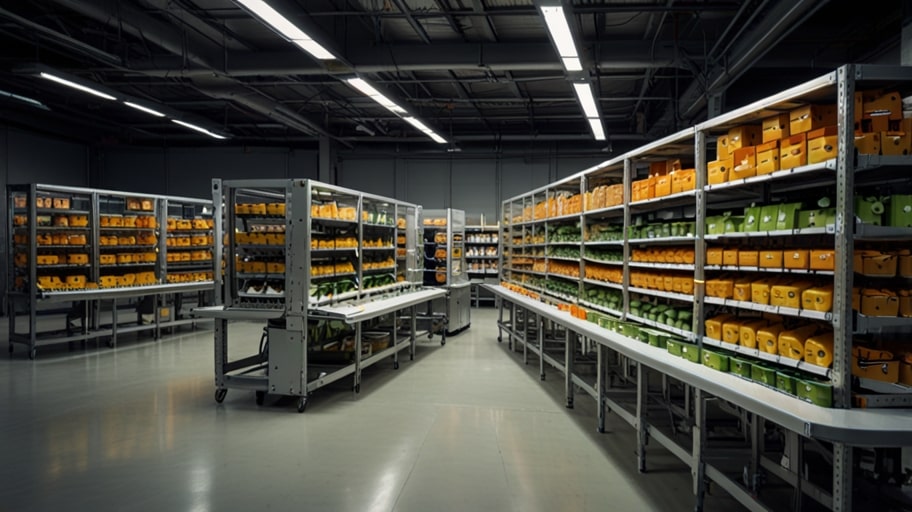
Ocado’s Smart Retail Reshaping UK Grocery Shopping
Ocado was founded in 2000 by three former Goldman Sachs bankers. Their vision was simple but ambitious: establish an online grocery platform that would ensure efficiency and customer experience. Unlike conventional supermarkets, Ocado does not have physical stores but instead operates with sophisticated warehouses and delivery systems that can cater to the demands of millions of people.
Technology at the Core
Ocado’s whole operation is based on its technology, which is unique to the company. The well-organized and automated warehouses, recapitulated with the use of robotics, AI, and machinery, which are capable of processing thousands of orders with almost 100% precision. CFCs, the company’s technologically advanced high-tech warehouses, are designed to carry out the processes of the whole supply chain from picking, packing, to delivery in the least amount of time, hence, very little or no wastage in the process.
Redefining Customer Experience
Ocado personalizes the shopping experience of British consumers. It is characterized by the fact that it is the only store that offers a range of services without an equivalent. The user-friendly website and mobile app are the portals that allow clients to choose what they want from the thousands of products available. Keeping to the word through the provision of exact delivery time intervals, live food location tracking, etc., Ocado makes it easy for its customers to get fresh and timely groceries. The firm’s attention to detail regarding service and product quality has resulted in a very sizable customer base.
Sustainability and Innovation
Ocado is a dedicated park keeper of environmental sustainability by implementing eco-friendly activities in its daily business. In addition, its vans are electric-powered, hence they have zero carbon emissions, and on top of that, a smart routing method is employed to lessen fuel consumption. The company is also taking a step further by making investments that will help to cut food waste through improved inventory management done on the basis of data. Through data, companies are now aware of the customers’ expectation of them becoming part of those organizations that have the environment at heart.
Global Expansion and Partnerships
Ocado’s reach is not confined to just the UK. The company licenses its technology through the Ocado Solutions division to worldwide retailers such as Kroger (USA) and Coles (Australia). These partnerships are typical cases in point of Ocado’s scalable platform and core technology, which international brands can easily implement and thus reach a global market by exporting and importing goods.
Navigating Economic Challenges
Ocado has been affected by economic issues despite its immense achievements. The company has had to deal with inflation spikes and unexpected supply chain disruptions that have eroded its resilience. Nonetheless, the company’s investment in technology has neutralized these effects and even provided it with the benefit of having competitive prices. The company is able to respond to changes and still maintain a leading position in the market due to the adaptability of its business model.
The Role of Artificial Intelligence
AI is the main driver of Ocado’s operations. AI-powered algorithms are used to forecast customer demand, stock keeping optimization, and the entire logistics organization. The technology not only achieves optimized performance but also caters to customer preferences by conducting data analysis that offers personalized purchase suggestions, and thereby securing customer fidelity. Ocado’s AI-based solutions give them a competitive edge.
Workforce and Automation Balance
Ocado’s automation does not replace the human workforce. The company has a staff of thousands in its warehouses, tech hubs, and delivery networks. With their support by enhancing their skills to manage most of these advanced systems, Ocado creates a blended operation where both technology and human resources are the best of complements to each other, at the same time creating job arrays in a tech-based society.
Competing in a Crowded Market
The UK food industry has a number of big players with Tesco and Sainsbury’s being the key competitors. However, what makes Ocado different is its focus on technology and providing high-quality items, including an agreement with Marks & Spencer. This tie-up has gotten more customers to buy from them; they have become the market leaders in food delivery.
Financial Performance and Growth
The financial chart for Ocado mirrors its aggressive growth plans. Although the company struggled in the initial years because it invested heavily in technology, the latest financial results present a completely different story, showing a very positive future. The decision to forgo short-term material gains in favor of developing novel products and services inspired confidence among investors, whose excellent response to the business factored into the market’s appreciation.
Challenges of Scaling Technology
Their shift to automation to distribute technology on a larger scale has become a problem. A lot of funds are required to build new automated warehouses, and the company has also ventured overseas, which has brought about problems of a legal and administrative nature. Nevertheless, Ocado’s attention to detail and the robustness of its system have paved the way for the swift conquering of local and global markets and the continuous growth that comes with it.
Customer Loyalty and Brand Strength
Ocado is a company that is greatly respected for technological advancement and believes that they are the most reliable online shopping brand in the UK. Their Smart Pass program is a subscription-based program that not only offers an incentive to the customer to remain loyal through free delivery on all orders and discounts, but also maintains the relationship with the customer. Consistently providing the best quality and convenience is what has enabled Ocado to be a force to be reckoned with, especially when considering the competitive UK online grocery retail market.
The Future of Grocery Retail
As the market moves forward, Ocado is positioned to create the future of grocery shopping. The company is in talks of having drones delivering goods and is in the process of creating a stronger AI system to further raise performance levels. With the consumers’ change of hearts toward the digital market and online shopping, Ocado is leading the field by virtue of its technological and web-based approach.
Community and Social Impact
Ocado’s operations go way beyond the mere economic sphere and the company is taken into account as an important player in community affairs. The enterprise feeds the hungry in cooperation with local charities through their surplus food donation program which is an effective measure in fighting food insecurity. Its adherence to ethical business practices speaks volumes to conscious consumers, giving the company a further edge in terms of its standing as a thoughtfully designed corporate entity among people in the UK and other places as well.
A Model for the Industry
Ocado, setting out to be a pioneer from the early days of its birth to its current state as a grocery shopping trendsetter, has been quite a trip. Thanks to the good use of various technological options, the provider not only has shifted the nature of grocery shopping but has also established a new standard for the whole sector, which now has to catch up. Its agility and creativity in the field are enough to enable it to remain at the forefront of the business sector.
Conclusion: A Visionary Leader
The combination of the latest technology, sustainability, and customer orientation is a differentiating factor for Ocado in the U.K. business arena. Furthermore, this goes beyond merely selling food and demonstrates that the company is not just a supermarket; it is the world’s new shopping behavior architect. Innovativeness, too, along with persistence and seeking the best, gave birth to this wonderful tale.



 Bitcoin
Bitcoin  Ethereum
Ethereum  Tether
Tether  XRP
XRP  USDC
USDC  Solana
Solana  TRON
TRON  Lido Staked Ether
Lido Staked Ether  Cardano
Cardano  Avalanche
Avalanche  Toncoin
Toncoin